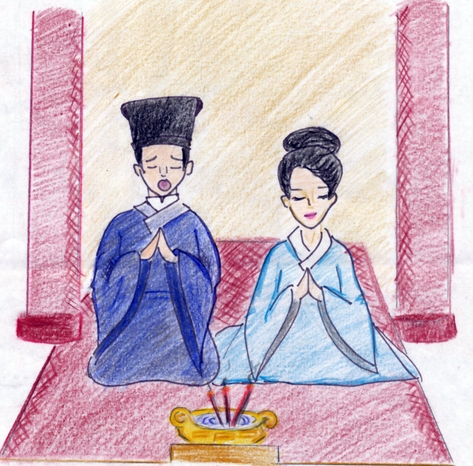
“He contrived to kneel in prayer beside the beautiful Qiūxiāng, with one knee ‘accidentally’ resting on the hem of her gown..”
(Drawing by Daniella Gochuico, Eleanor Roosevelt College, UCSD, Class of 2019, by permission.)
TÁNG Bóhǔ 唐伯虎 = a talented scholar, famed despite his youth
Qiūxiāng 秋香 = a maid in the house of the Huà 华 family
TÁNG Bóhǔ 唐伯虎 of the Míng 明 dynasty (period 20) was a handsome, young, and very eligible bachelor, and at the same time he was already a renowned scholar, the sort of man who would set any Míng dynasty maiden’s heart aflutter.
Qiūxiāng 秋香 (“Autumn Fragrance”) was a charming and remarkably beautiful chambermaid in the household of the wealthy HUÀ 华 family, the sort of girl who had the serving lads mad to be in her presence.
One day Old Madame Huà, with her entourage, went to a Buddhist temple to offer incense and visit the priests. By chance Scholar Táng was in the vicinity and saw them dismount from their palanquins before the temple.

Stunned by the beauty of the chambermaid, he followed them into the temple, and contrived to kneel in prayer beside the beautiful Qiūxiāng, with one knee “accidentally” resting on the hem of her gown. As a result, she could not immediately get up and follow Madame Huà out of the sanctuary, but rather was trapped kneeling beside Táng and was forced to listen to his fervent prayer that the pretty young maid should find an appropriate husband. (Some say that she also knelt and prayed that the handsome young scholar should find an appropriate wife.)
When she finally reentered her palanquin to return with her mistress and the other maids, she smiled every so daintily at Táng, which showed him that his attentions had been neither unnoticed nor unappreciated. Táng therefore decided that she loved him passionately, which drove him to yet greater love for her, leading him to rather foolish lengths in an effort to see her again.
In order to pursue his great love, Táng Bóhǔ eventually disguised himself as a shabby rustic and had himself indentured to the Huà family as a servant, where was given the name of HUÀ Ān 华安. As Huà Ān, he sought to woo the delightful, if occasionally coquettish, Qiūxiāng. After considerable confusion and countless arias, they at last were married and lived happily ever after.
[This was not a major opera in the typical company’s repertoire, but it became a very popular Hong Kong movie, first in black and white, then in a later color remake, and therefore has perhaps been seen by more people than any other Chinese opera in the second half of the XXth century.]